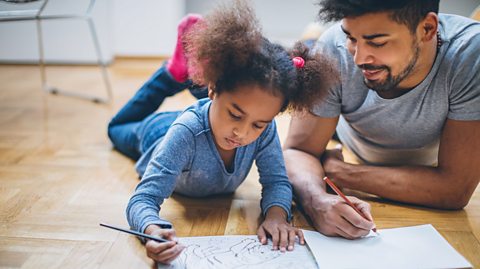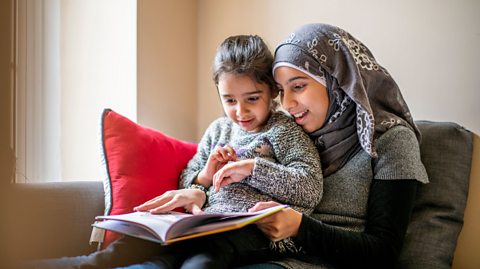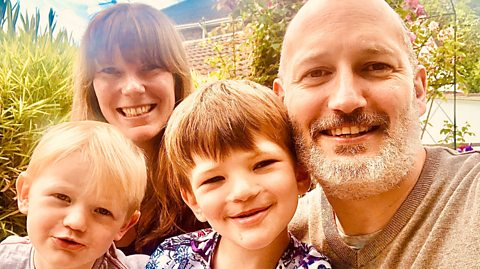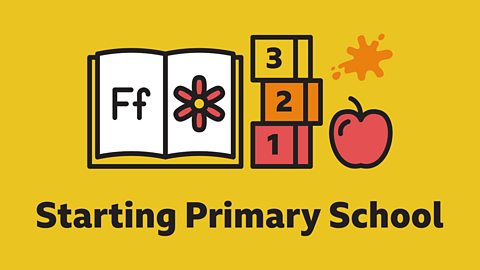This article was last updated on 24 August 2020
by Paula Nagel, Educational Psychologist
Starting school is a big event which typically involves a rollercoaster of emotions. This year, however, isnÔÇÖt typical and we might already feel as if we've been riding the emotional rollercoaster for some time.
As we continue to adapt to the uncertainties of the pandemic, we canÔÇÖt always prepare for big events as we usually would - and starting school is one of them. So if your child is starting school this year and youÔÇÖre worried about the impact of the current situation and being ÔÇśschool readyÔÇÖ, youÔÇÖre not alone!
Here are some tips to help your child - and you - feel confident about the big day.
1. Focus on the things you can control
 Image source, Getty Images
Image source, Getty ImagesYou may have had expectations about the run up to starting school, the meetings and visits, that havenÔÇÖt been able to take place. Focusing on what might have been and the things that are out of our control can be emotionally draining, but remember that your child is unlikely to be aware of these expectations and will take the new plans at face value. Try instead to focus on what you can do to help your child feel confident and excited about starting school.
Although you may not have been able to visit your childÔÇÖs new classroom, many schools have online tours, photographs and school information on their website. Share this information with your child so they are familiar with people and places. Take a virtual tour of a reception class and make a list of the activities they are looking forward to trying. If you can, rehearse the school run a few times. Help your child practise important independence and social skills such as getting dressed, making choices and taking turns. You can explore some of these themes in the My First Day at School game.
2. Wonder about emotions
 Image source, Getty Images
Image source, Getty ImagesHelping your child to begin to put their feelings into words is a step towards school readiness. When children can recognise their feelings, and say things like, ÔÇśThat makes me madÔÇÖ or ÔÇśIÔÇÖm feeling scaredÔÇÖ then they are less likely to be hijacked by difficult emotions that can get in the way of learning and making friends. Young children often watch adults to learn how to deal with their emotions, especially during challenging times. Set an example by talking about some of your basic feelings using words like ÔÇśhappyÔÇÖ, ÔÇśsadÔÇÖ, ÔÇśangryÔÇÖ, ÔÇśscaredÔÇÖ, ÔÇśexcitedÔÇÖ, and use books and stories to explore how the characters are feeling.
Try to put yourself in your childÔÇÖs shoes and notice and wonder how they might be feeling and why. Remember that they may not share your concerns about the current situation and may be more worried about things like making friends, what happens at lunchtimes and breaktimes, and using the bathroom. Help them to notice how their body responds to their different feelings. For example, ÔÇťI can see you are frowning and IÔÇÖm wondering if thatÔÇÖs because youÔÇÖre feeling puzzled or worried? Is that right?ÔÇŁ
As well as noticing and naming emotions itÔÇÖs important to help your child learn that there are things we can do to manage our feelings. Why not make a calm box or self-soothing bag filled with things you both enjoy and can do together when youÔÇÖre feeling big emotions like worry, sadness or anger? Try putting a range of things in your calm kits like bubbles, favourite books, soft toys, textured materials, colouring or sorting activities, and see what works best.
Being able to notice feelings, name them, and find ways to manage them is a lifelong skill, and itÔÇÖs never too early to start encouraging this.
3. Try to give information that is ÔÇśjust rightÔÇÖ for your child
 Image source, Getty Images
Image source, Getty ImagesDonÔÇÖt be afraid to talk about any difficult feelings children may have about school or the current situation. Understandably, we often have the urge to make things better and solve or get rid of the emotion as quickly as we can, especially if itÔÇÖs a difficult or painful one. But thatÔÇÖs not always possible or the most helpful thing to do.
Try to listen carefully, take their worries seriously and see things from their point of view. For example, ÔÇťI know youÔÇÖre worried about meeting your new teacher and itÔÇÖs ok to feel worried when things are new and different.ÔÇŁ Then try to give honest information to reassure them. ÔÇťYour teacher is there to look after you and they want you to be happy. They will have lots of exciting things planned to get to know you and help you make friends.ÔÇŁ ItÔÇÖs ok not to have all the answers but try to be open and honest, giving ÔÇśjust the right amountÔÇÖ of information. You know your child best, so remember the idea of not giving ÔÇśtoo muchÔÇÖ or ÔÇśtoo littleÔÇÖ.
4. Try to establish some routines
 Image source, Getty Images
Image source, Getty ImagesHaving a routine can be like putting down an anchor when things around us feel different, so keeping some familiar home routines is always a good idea when children start school. However this year, with the disruption of the pandemic, we may have lost many of our established routines. Your child may have spent longer periods of time at home and you may be worried about how they will separate from you during those first few days. Remember itÔÇÖs normal for young children to show some distress when they go into an unfamiliar situation, and this usually wonÔÇÖt be long-lasting.
Try to reassure your child by giving them simple, practical information about the school day and drop-off and pick-up arrangements. ItÔÇÖs a really good idea to try to get some regular routines in place before your child starts school. Think about how you can make bedtime, morning, and after school routines more predictable. In the weeks leading up to the start date try to practise morning and evening routines.
Familiarise your child with the school run, or make laying out the uniform, packing the school bag and the bedtime story all part of the usual bedtime routine. If you have information about the plans for breaktimes and lunchtimes, and expectations for handwashing and sanitising in school, make this into a story for your child so that it feels familiar before it happens. Routines can help us all feel safer; if we know what to expect, it can take away some of the guesswork and stress.
5. Remember to look after yourself
 Image source, Getty Images
Image source, Getty ImagesLooking after your own wellbeing needs to be a priority. ItÔÇÖs so much harder to be there for your childÔÇÖs emotional ups and downs if you donÔÇÖt care for yourself first. It also sets a good example for your child too. Self-care is very personal and can look different for each of us. Try to spend some time thinking about the healthy things that help you feel good about yourself, switch off and relax.
Find out what works for you - whether thatÔÇÖs having a quiet cup of tea, catching up with a friend, keeping a journal, yoga, listening to music, or walking the dog. Starting school isnÔÇÖt a one-off event, but a process which will last over the coming weeks and months, so try turning your own self-care into a long-term habit. DonÔÇÖt think of it as a luxury; itÔÇÖs a necessity.
By Paula Nagel, Principal Educational Psychologist at childrenÔÇÖs mental health charity Place2Be.
How are families feeling about their child starting school?
Families from around the UK share their experiences and feelings ahead of their little one starting primary school for the first time.

Game - My First Day at School
Explore with your child what their first day of school might be like and play some classroom activities.

More Starting Primary School videos and articles
Head to our homepage to help you and your child prepare for starting primary school and thrive in school life.
